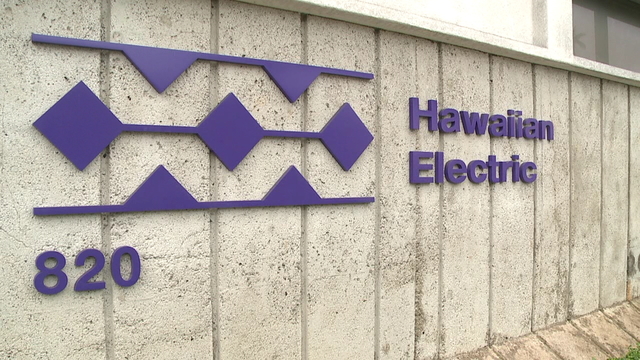Update 8:45 PM 4/28/24 ***HECO says it has provided legislators with an interim wildfire mitigation plan, which was submitted to the PUC in February and is posted here. HECO adds it has provided lawmakers with more detailed plans and dollar estimates for work going forward. ***
HONOLULU (KHON2) — The union representing electrical workers is now weighing in on a controversial Hawaiian Electric bill (SB 2922), that died in session last week.
The bill could help keep HECO in good financial standing following the Maui fires, and without it, many are worried HECO could end up bankrupt.
Heading into the final week of the legislative session, Governor Josh Green and IBEW 1260 business manager Leroy Chincio Jr. are asking lawmakers to reconsider the bill which would allow HECO to issue rate-payer backed bonds also known as securitization for wildfire mitigation efforts.
It would also increase rates for customers, but HECO has said it’s the cheapest option, with a potential 5% cap.
Chincio said he was shocked when he heard SB 2922 was being deferred.
“We’re concerned if HECO went into bankruptcy, the uncertainty would be crazy,” he said. “We have jobs, benefits, retirement at stake.”
IBEW 1260 represents about 1,200 electrical employees under Hawaiian Electric Industries.
Following Sen. Jarrett Keohokalole’s deferral on Thursday, Governor Josh Green asked if lawmakers could discuss options through the weekend and come back to the table on Monday, April 29.
Gov. Green said the bill helps control increasing costs which in turn, allows HECO to borrow money at a good rate.
“If the rest of the world sees our company as vulnerable, vulture capitalists’ will come in and take over and our costs will go through the roof and I don’t want to see that,” said Governor Green.
“We’ve seen this in other fires, we’ve seen rates go up, up, up and we don’t want to have that happen,” he continued. “If you let these things drift and there’s going to be a lot of lawsuits, a lot of litigation, the pressure will mount; and eventually the pressure will be whether the company goes bankrupt and that’s the problem.”
But lawmakers seem to be holding steady on their decision and have seen what other utility companies have done following devastating fires.
“PG&E just enjoyed its most profitable year ever and electrical rates in California are at their highest point in history,” said Sen. Keohokalole regarding PG&E and the deadly Camp Fire in 2018.
***In February, PG&E announced record profits in 2023 bringing in $2.2 billion, following a series of rate hikes.***
“This is not something that we took lightly, this is a terrible situation. I do not want HECO to go bankrupt, but we need some transparency,” he added.
Last week, lawmakers asked HECO to provide a fire mitigation plan, which lawmakers said they failed to do.
“At that briefing last week, in the closing days of the legislature, was the first time HECO said they would like authorization to use the money to pay for the wildfire lawsuits at no point prior was that a part of the conversation,” said Sen. Keohokalole. “I think the taxpayers deserve transparency in the discussion and it leads you to ask what’s really going on here?”
***HECO said the earliest versions of the securitization legislation proposed by the company back in January included use of securitized funds for settlement claims. SB 2922 SD1 had the following language:
(1) The costs and expenses are authorized by the commission for recovery, which shall be limited to the following eligible categories:
(A) Prudently incurred costs that are consistent with a commission-approved plan to mitigate wildfire risk and impacts; and
(B) Costs consistent with a commission-approved settlement plan for wildfire liabilities that limits the burdens on ratepayers and requires shareholder-backed offsets;
In regards to IBEW’s concerns, Sen. Keohokalole added that HECO didn’t offer worker protections for employees or assurance they would remain locally owned and controlled throughout the legislative session.
“This bill does not offer protections to HECO and local workers, this bill does not offer assurance that HECO will remain locally owned and operated. What this bill does, is offer a blank check to HECO for an unitemized list of expenses, that they will charge to ratepayers for the next 30 years,” he continued.
He said the Public Utilities Commission plans to work over the summer and Fall on wildfire mitigation plans for all public utilities.
“Once those plans are published through a public process, we will have this information I think ratepayers expect should be available before they are committed to pay this fee on their electric bill for the next 30 years,” he said.
